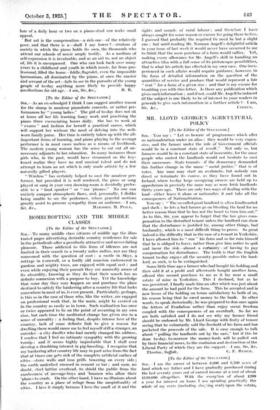MR. LLOYD GEORGE'S AGRICULTURAL POLICY
[To the Editor of the SPECTATOR.] SIR,—You say : "Let us beware of programmes which offer us nationalization under an alias ; they would be very expen- sive, and the farmer under the rule of Government officials would be in a constant state of revolt." Not only so, but farmers would be in a constant state of insecurity, for the same people who ousted the landlords would not hesitate to oust their successors—State tenants—if the democracy demanded this further change in the name " social justice," that is of votes. Any , man may start an avalanche, but nobody can direct or terminate its course, as they have found out in Ireland, where to-day large occupying owners are held up to opprobrium in precisely the same way as were Irish landlords thirty years ago. There are only two ways of dealing with the land—either leave it alone or nationalize it and take all the consequences of Nationalization.
You say : "The so-called good landlord is often kindhearted and slack ; he lets a bad farmer go on bleeding the land for no better reason than that he has not the heart to turn him out." As to this, Sir, you appear to forget that the law gives com- pensation to the disturbed tenant unless the landlord can show that the disturbance is justified by, among other things, bad husbandry, which is a most difficult thing to prove. So great indeed is the difficulty that in the case of a tenant in Yorkshire, I have allowed him to " run " his farm and so far ruin himself that he is obliged to leave, rather than give him notice to quit and incur the risk—almost .a certainty—of having to pay compensation for disturbance. The truth is that the English .tenant to-day enjoys all the security possible unless the land- lord, as such, is to be extinguished.
Some little time ago a farmer who had bought his holding and then sold it at a profit and afterwards bought another farm, offered this second purchase to me as it lay near a small estate of mine in Yorkshire. This I declined, but as he was persistent, I finally made him an offer which was just about the amount he had paid for the farm. This he accepted and is now lessee of the holding on terms satisfactory to both of us, his reason being that he owed money to the bank. In other .words, to speak rhetorically, he was prepared to don once again the fetters of Feudalism rather than enjoy social freedom coupled with the consequences of an overdraft. So far we are both satisfied and I do not see why my farmer friend should be endowed by Mr. Lloyd George with fixity of tenure seeing that he voluntarily sold the freehold of his farm and has pocketed the proceeds of the sale. It is easy enough to talk about "pulling the landlords out by the ears," but if this be done to-day, to-morrow the money-lords will be pulled out by their financial noses, to the confusion and destruction of the Liberal Party of which they are the support.—! am, Sir, &c.


























































 Previous page
Previous page